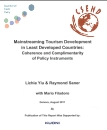 Tourism is a significant contributor to GDP, employment and to the international appreciation of a country and its culture – regardless of its level of development. This policy analysis seeks to assist the Least Developed Countries (LDCs) in harnessing development opportunities by providing a comprehensive overview of existing international development instruments, i.e., Diagnostic Trade Integration Studies (DTISs) and their Action Matrices, Poverty Reduction Strategy Papers (PRSPs), and reviewing their alignment with the national tourism development strategies, investment policies and tourism related trade arrangements.
Tourism is a significant contributor to GDP, employment and to the international appreciation of a country and its culture – regardless of its level of development. This policy analysis seeks to assist the Least Developed Countries (LDCs) in harnessing development opportunities by providing a comprehensive overview of existing international development instruments, i.e., Diagnostic Trade Integration Studies (DTISs) and their Action Matrices, Poverty Reduction Strategy Papers (PRSPs), and reviewing their alignment with the national tourism development strategies, investment policies and tourism related trade arrangements.
A debate has sprung up on the Internet among economists and social scientists tracking the India story involving Jagdish Bhagwati , Amartya Sen, Martin Wolf and many others. The basic question is: Should India continued to focus exclusively on high growth or should it invest more in social programmes as well. In regard to development strategy, should trade and economic policy have the upper hand over social and political policy- or a mix of both with different time frames and priorities. At issue are the need to reduce high levels of poverty and equally high level of inequality.
![]() The Financing for Development Office of the United Nations recently published an excerpt of Prof. Raymond Saner's ground breaking article on "The International Monetary Fund's Influence on Trade Policy: A Legal Critique" in its Newsletter, The Road to DOHA (link). The original article was published in the Journal of World Trade, 41(5): 931-981, 2007.
The Financing for Development Office of the United Nations recently published an excerpt of Prof. Raymond Saner's ground breaking article on "The International Monetary Fund's Influence on Trade Policy: A Legal Critique" in its Newsletter, The Road to DOHA (link). The original article was published in the Journal of World Trade, 41(5): 931-981, 2007.
This paper focuses on the function of Inter-ministerial Policy Coordination (IMPC) and its critical role in governance. Following a definitional section, the authors give an overview of public sector governance in Eastern & Central Europe and Central Asia and then discuss the application of governance principles to Inter-ministerial Policy Coordination in these regions. They conclude with specific examples from the Republic of Macedonia and Central_Asia.